Introduction
Travel applications have altered how we organize and enjoy our travels in today’s digital world, as cell phones have become an essential part of our daily lives. From booking flights and accommodations to discovering local attractions and navigating unfamiliar territories, travel apps have become crucial companions for modern-day travelers.
In this comprehensive guide, we will explore the reasons why we need to create travel apps, the benefits they offer in 2023, different types of travel app development, the steps to make a successful travel app, essential features to include, required app tech stacks, the price of development, and why RichestSoft is an excellent choice for travel app development.
Why Do We Need to Create a Travel App?
The travel industry is rapidly evolving, and consumers now prefer the convenience and ease of mobile applications to plan their trips. Travel applications provide several benefits, including simplified booking procedures, real-time information, individualized suggestions, and improved travel experiences. Businesses may capitalize on this expanding need, access a larger market, and get a competitive edge by developing a travel app.
What are the Benefits of Travel App Development in 2023?
Travel app development in 2023 presents numerous benefits for both businesses and travelers. It enhances consumer involvement, cultivates brand loyalty, and creates new revenue sources for enterprises.
However, visitors may benefit from the ease of immediate reservations, access to customized itineraries, real-time data on flights and lodgings, and the chance to experience a location like a native. Moreover, travel apps often integrate features like reviews and ratings, allowing users to make informed decisions while selecting services.
Types of Travel App Development in 2023
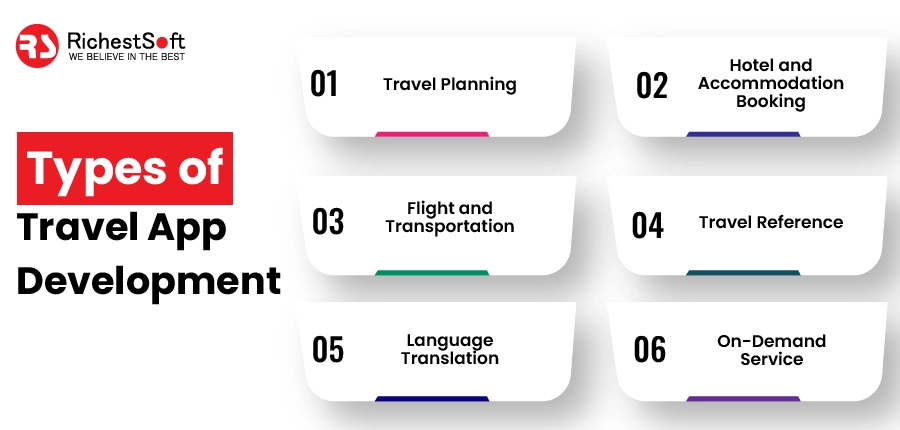
- Travel Planning Apps: These apps help users with itinerary creation, suggesting popular destinations, recommending attractions, and providing travel tips.
- Hotel and Accommodation Booking Apps: Users can browse, compare prices, and book hotels, vacation rentals, or other accommodations based on their preferences. These apps specifically focus on hotel and accommodation bookings. For customers to hunt, sort, and book lodging, resorts, holiday rentals, and other accommodation alternatives, they provide a variety of possibilities. To help customers, choose the best housing. These applications frequently provide features like live maps, consumer feedback, and ratings.
- Flight and Transportation Apps: These apps offer features like flight bookings, real-time updates, ticket management, and information on public transportation options. Transportation and commute apps focus on providing information and services related to local transportation options. For public transit systems, taxis, rideshare offerings, and other forms of travel in various cities, they provide real-time updates, timetables, routes, and booking services.
- Travel Reference Apps: They offer in-depth details on a specific location, including nearby restaurants, activities, maps, and travel advice from other users. These apps focus on providing users with exclusive travel deals, discounts, and offers. They aggregate discounted flight tickets, hotel stays, vacation packages, and other travel-related promotions. Users can explore and take advantage of the best deals available for their desired destinations.
- Language Translation Apps: These apps assist travelers in communicating with locals by providing translation services for different languages. Language and translation apps aid travelers in overcoming language barriers. These apps offer translation services, phrasebooks, and language-learning resources. Users can communicate effectively with locals, understand signage, and navigate foreign languages, enhancing their overall travel experience.
- On-Demand Service Apps: Apps like food delivery, car rental, or concierge services make travel more convenient by offering services at the traveler’s fingertips.
What are the Steps to Make a Successful Travel App?
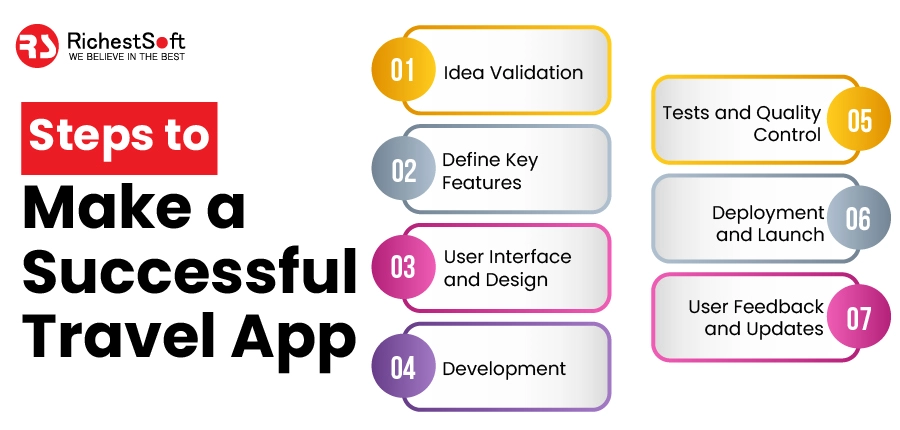
✅Idea Validation:
Before diving into the app development process, validate your app idea. Identify your target audience, conduct thorough market research, and analyze the competition. This step helps ensure that your travel app idea is viable and has potential in the market.
✅Define Key Features:
Determine the core features that your travel app will offer. These features may include flight and hotel bookings, real-time updates, personalized recommendations, social integration, maps and navigation, reviews and ratings, trip planning, and language translation services. Prioritize the features based on user needs and market demands.
✅The user interface and design:
Design a UI (user interface ) that is simple and aesthetically pleasing while providing a smooth user experience (UX). Design wireframes and prototypes to visualize the app’s layout and navigation flow. Focus on simplicity, ease of use, and quick access to essential information. Incorporate attractive visuals, smooth transitions, and clear navigation elements.
✅Development:
Select the appropriate technology stack for your travel app development. It includes choosing the programming languages, frameworks, and tools. For native app development, you may use Swift or Objective-C for iOS and Java or Kotlin for Android. Cross-platform frameworks like React Native or Flutter are considered for developing the app simultaneously for multiple platforms. To enable the program’s functionality, create the backend facilities, including databases, server-side parts, and APIs.
✅Tests and Quality Control:
Test the travel application carefully to check its usability, efficiency, safety, and function. Use a variety of testing approaches, including functional, accessibility, compatibility, efficiency, and safety testing. To guarantee a seamless user experience, find any flaws, kinks, or difficulties and repair them.
✅Deployment and Launch:
Create your travel app and get it ready to be released in the relevant app stores (like the App Store on iOS or the Android Play Store). Improve the metadata for the app, including the title, outline, phrases, and screenshots, to increase its exposure and draw in new users. Develop an advertising plan to raise awareness of and interest in your app. To maximize its reach, consider app store optimization (ASO) techniques, social media promotion, content marketing, and influencer collaborations.
✅User Feedback and Updates:
After launching your travel app, actively collect user feedback and reviews. Pay attention to the requirements, worries, and ideas of your users. Release frequent updates that include bug fixes, speed improvements, and new features to the app to improve it continuously based on user input. To guarantee their happiness and loyalty, interact with your users using chatbots, social media systems, and customer service channels.
Features of Travel App Development
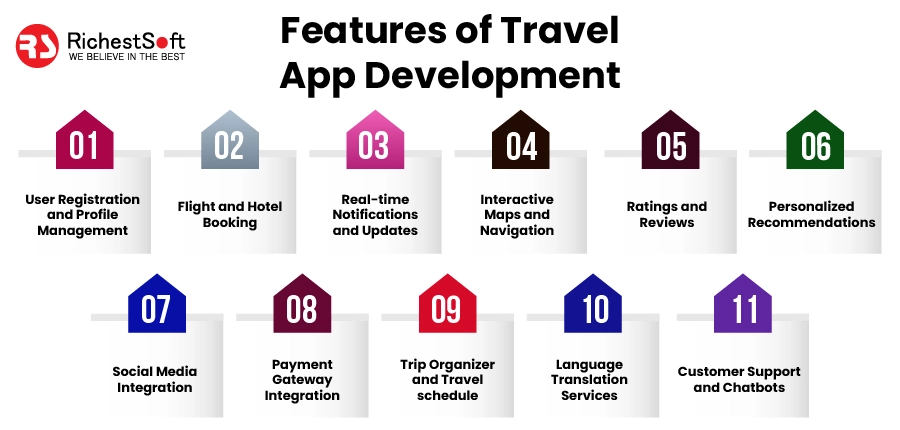
✅User Registration and Profile Management:
Allow people to register or create accounts using their social network login information. This feature enables personalized experiences, including saving preferences, viewing booking history, and accessing exclusive offers.
✅Flight and Hotel Booking:
Integrate APIs to enable users to search, compare, and book flights and hotels directly within the app. Provide filters for specific dates, destinations, amenities, and price ranges to enhance the booking experience.
✅Real-time Notifications and Updates:
Keep users informed about their travel plans, including flight status updates, gate changes, delays, or cancellations. Push notifications can also provide personalized recommendations, exclusive offers, and reminders for upcoming trips.
✅Interactive Maps and Navigation:
Incorporate maps and navigation features to help users explore destinations, find attractions, locate nearby amenities, and plan their routes. Integrate functionalities like GPS tracking, directions, and points of interest.
✅Ratings and reviews:
Customers can read and leave hotel, restaurant, attraction, and other travel-related offerings appraisals and ratings. This function promotes a feeling of belonging within the application and aids users in making informed decisions.
✅Personalized Recommendations:
Utilize algorithms and user preferences to offer personalized recommendations for destinations, attractions, hotels, restaurants, and activities. This feature enhances the user experience by tailoring suggestions based on individual interests and previous interactions.
✅Social Media Integration:
Permit users to publish reviews, images, and trip stories on social networking sites straight from the app. Incorporate social login options for easy account creation and social sharing functionalities.
✅Payment Gateway Integration:
Enable safe and practical mobile payments for booking activities, hotels, and additional amenities. Support a variety of payment options, such as debit and credit cards, portable wallets, or online payment systems, to ensure the checkout process runs smoothly.
✅Trip organizer and travel schedule:
Allow users to handle and build their travel schedules inside the app. Allow them to save flights, hotels, activities, and other details, ensuring easy access to their trip plans anytime, anywhere.
✅Language Translation Services:
Integrate language translation features to help travelers overcome language barriers. Offer real-time translation or provide essential phrases and words in multiple languages to facilitate communication with locals.
✅Customer Support and Chatbots:
Include a support system to address user queries, concerns, and issues. Implement chatbot functionality to provide instant responses, offer assistance, and guide users through the app, enhancing customer satisfaction.
What are the Tech Stacks Needed for Developing a Travel App?
👉Front-end Development:
For native iOS app development, the primary programming languages are Swift or Objective-C. Swift is the modern and recommended choice by Apple. On the platform used by Android, Java has historically been utilized, but Kotlin has become more popular because of its clarity and compatibility with Java. Structures like React Native and Flutter might be used for cross-platform programming, providing code exchange across Android and iOS devices.
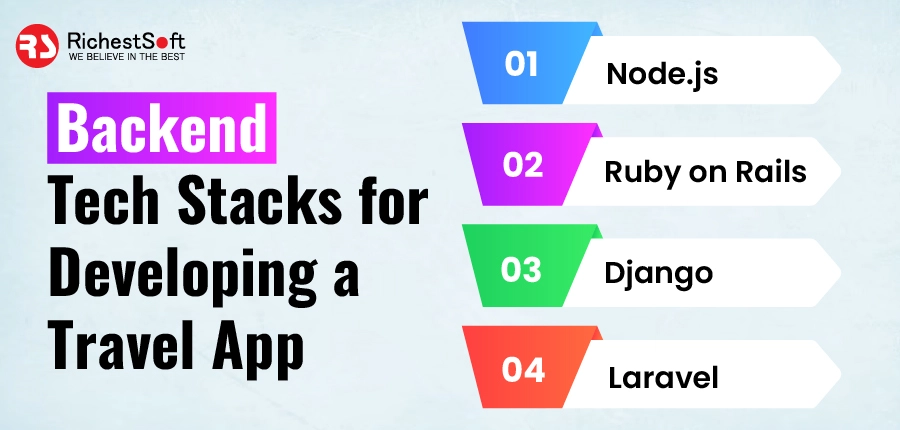
👉Backend Development:
The backend development of a travel app usually involves server-side programming, database management, and handling business logic. Well-known backend development platforms include:
- A JavaScript running environment called Node.js enables programmers to create scalable, quick apps for the server side.
- Ruby on Rails is a framework built on the well-liked and straightforward Ruby coding language. Rails offer efficient development and database integration, emphasizing convention over configuration.
- Django is a platform for the web built on Python that is renowned for its versatility, safety, and rapid development. For server-side programming, Django offers a comprehensive set of functionalities.
- Model-View-Controller (MVC) architecture is used by the PHP web platform Laravel. Laravel includes capabilities like travel, ORM (Object-Relational Maps), security, and simple and beautiful syntax.
👉Database Management:
The choice of database technology depends on factors like scalability, performance, and data structure requirements. Some commonly used databases for travel app development are:
- MySQL is a management system for relational databases that is open-source and well-supported by the community.
- MongoDB: This document-oriented database that does not use SQL offers versatility in storing unorganized information. MongoDB offers flexibility and is appropriate for processing massive amounts of data.
- Sophisticated open-source relational databases management system PostgreSQL is renowned for its reliability, versatility, and adherence to SQL rules.
👉APIs and Frameworks:
Integration of third-party APIs and frameworks enhances the functionality and features of a travel app. Some popular APIs and frameworks used in travel app development are:
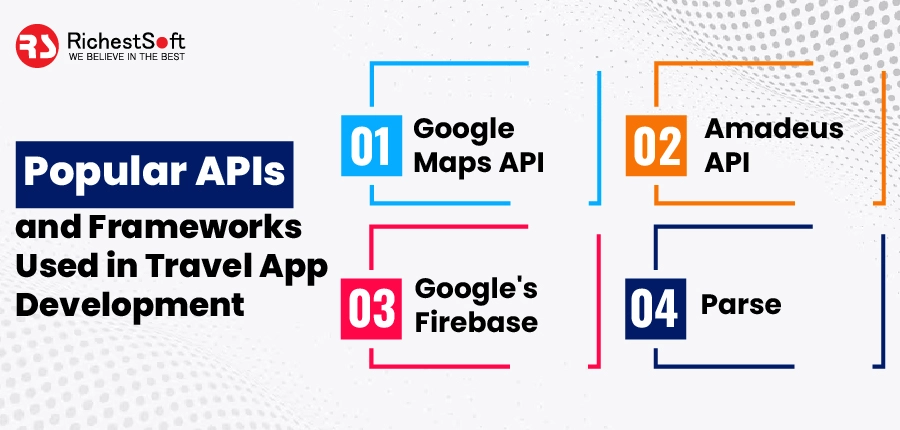
- Google Maps API: It provides access to mapping and location-based services, enabling features like interactive maps, directions, geocoding, and place search.
- Amadeus API: It provides a range of travel-related features, such as airline and hotel look, vehicle rental, and travel-related information.
- Google’s Firebase is a mobile and online development platform with real-time databases, authenticated users, online storage, and notification pushes, among other capabilities.
- Parse: It constitutes a freely available backend-as-a-service (BaaS) system that simplifies implementing server-side features like push messages, user logins, and data retention.
What is the Price of Developing a Travel App in 2023?
The level of detail of the application, the number of characteristics, the platform(s) aimed (iOS, Android, and both), the place of residence and experience of the creative team, and the duration of the project all play a role in deciding the exact cost for creating a travel app within 2023.
However, we can give you a broad idea of the cost spectrum using industry norms and typical pricing methods.
👉Basic Travel App:
A simple travel app often has functions like searching, basic user profiles, booking hotels and flights, and limited connections. Designing an app of this type can cost between $25,000 and $50,000.
👉Medium-Complexity Travel App:
Real-time alerts, dynamic maps, tailored suggestions, ratings and evaluations, social network integration, and extensive search capabilities are all included in medium-complexity travel apps. This app may cost between $50,000 and $100,000 to build.
👉Advanced and Highly Customized Travel App:
A complicated travel app with features like trip routes translation services for different languages, payment gateway integration, intelligent intelligence-powered virtual assistants, and a robust backend structure could run you over a hundred thousand dollars. Depending on criteria such as personalization and intricacy, the final cost could vary from $105,000 to $155,000 or higher.
Understanding that these prices are estimates and may vary significantly based on the project’s specifics and the manufacturing team’s rates is critical. Future network upgrades, improvements, and services may incur additional costs.
The pricing models commonly used for travel app development include the following:
Fixed Price:
A fixed price model involves agreeing upon a fixed cost for the entire project. This model is suitable when the project requirements are well-defined and unlikely to change significantly during development.
Time and Material:
The time and material model charges are based on the actual time and resources spent on the project. It offers flexibility to accommodate changes and additions during development, making it suitable for projects with evolving requirements.
Dedicated Team:
In the particular team model, you assemble a group of experts, including programmers, designers, and other specialists, to focus only on their travel app project. The crew’s size and the project’s length determine the price.
It is suggested that you analyze the project’s specifications, requirements, and expenses utilizing software engineering organizations or third-party vendors to receive actual estimated costs that are tailored to your individual needs.
With this in consideration, the price of writing a travel application is simply one aspect to consider. To create a profitable and competitive travel app, it is essential to put quality, customer service, and continuing support first.
Why Choose RichestSoft for Travel App Development?
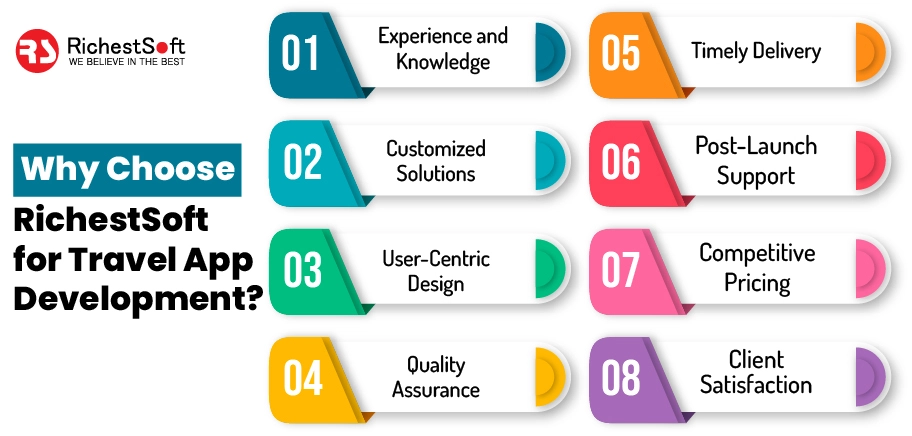
When considering improving travel app development, selecting the correct development collaborator is critical to the project’s performance. RichestSoft is a leading software development company offering compelling reasons to consider them for your travel app development needs. Here are some crucial considerations:
✔️Experience and Knowledge:
RichestSoft has a proven track record in travel app development. They have the know-how to produce top-notch, dependable, and cutting-edge travel applications thanks to their years of knowledge and staff of qualified specialists. Their developers are skilled in the most recent frameworks, innovations, and business best practices.
✔️Customized Solutions:
RichestSoft understands that every travel app project is unique. They use a customer-centric philosophy and collaborate extensively with customers to comprehend their individual needs and corporate goals. It allows them to provide customized solutions that complement your vision, advertising, and target market.
✔️User-Centric Design:
RichestSoft strongly emphasizes creating intuitive and visually appealing user interfaces (UI) that offer exceptional user experiences (UX). They carefully design the app’s layout, navigation, and interactive elements to ensure ease of use, engagement, and positive user interactions.
✔️Quality Assurance:
RichestSoft is committed to delivering travel apps of the highest quality. They have an effective quality assurance procedure, including strict testing procedures. It guarantees that the software runs smoothly, performs admirably, and offers customers a bug-free experience across various devices and systems.
✔️Timely Delivery:
Meeting project deadlines is crucial in the fast-paced app development industry. RichestSoft understands the importance of timely delivery and adheres to project timelines. Their project management practices ensure efficient resource allocation, effective communication, and proactive problem-solving to ensure your travel app is delivered on time.
✔️Post-Launch Support:
RichestSoft provides comprehensive post-launch support to ensure the continued success of your travel app. They offer app maintenance services, bug fixes, updates, and assistance scaling the app as your business grows. Their support team is responsive and dedicated to addressing issues or concerns after launching the app.
✔️Competitive Pricing:
RichestSoft offers competitive pricing for travel app development services. They provide transparent pricing models and work within your budget to deliver cost-effective solutions without compromising quality or functionality. They provide detailed project estimates so you clearly understand the costs involved.
✔️Client Satisfaction:
RichestSoft has a strong reputation for client satisfaction. They are dedicated to providing outstanding service to customers and have an assortment of completed projects and satisfied clients to prove it. Their passion and expertise are demonstrated by their emphasis on creating lasting customer connections.
FAQs
Q1: How long does it take to develop a travel application?
Ans: Based on the software’s features and complexity, its creation timeline may differ. Overall, it may require three to six months.
Q2: Can I include services from outside parties in my travel app?
Ans: APIs and outside resources like payment processors, mapping tools, and hotel booking sites are frequently integrated into travel apps.
Q3: Is it required to create distinct iOS and Android apps?
Ans: It is contingent on your financial status and target market. Wider reach is ensured by creating different apps across every platform. However, development for all platforms utilizing technologies like React Native might be a more affordable option.
Q4: How can I ensure the security of user data in my travel app?
Ans:
- Ensuring the security of user data is crucial for any travel app. To safeguard user data, you can implement various security measures. Some best practices include:
- Secure Data Storage: Use methods of encryption alongside safe practices to store private user data, including personal and financial information. Consider adhering to data protection laws like the General Personal Information Agreement or the Privacy Act of California.
- Implement vital authentication techniques, such as two-factor and biometric entry, to block illegal usage of account data.
- Connecting third-party APIs securely means ensuring they adhere to security standards and using encrypted communication routes.
- Regular Security Audits: Conduct regular security audits to identify and address vulnerabilities promptly. Keep up with the most recent security upgrades and fixes for the underpinning technologies of your app.
- You may improve the safety of customer data and cultivate trust among your app’s customers by taking an active approach to security and abiding by industry-standard procedures.
Q5: How can I make my travel app profitable?
Ans: Monetizing your travel app can be achieved through various strategies. Here are a few popular monetization models for travel apps:
a. In-App Advertising: Display targeted advertisements within your app. It can include banner ads, interstitial ads, native ads from advertising networks, or affiliate partnerships with relevant travel brands.
b. Paid App or Subscription: Offer your app as a paid download or provide premium features and content through a subscription model. It can be appealing if your app offers exclusive or specialized travel services.
c. Commission-Based Model: Collaborate with travel service providers, such as hotels, airlines, or tour operators, and earn a commission for every booking or transaction made through your app.
d. Sponsored Content: Partner with travel brands or destinations to promote their products or services within your app. It can include sponsored articles, featured listings, or sponsored recommendations.
e. In-App Purchases: Offer additional features, upgrades, or virtual goods within your app for users to purchase. For example, you could provide access to excellent travel guides, language packs, or exclusive travel content.
Conclusion
Travel app development has become indispensable in 2023, offering numerous benefits for businesses and travelers. The convenience, personalization, and ease of use of travel apps enhance the overall travel experience. By following the steps mentioned in this comprehensive guide and leveraging the right tech stacks, businesses can create successful travel apps that cater to the evolving needs of modern-day travelers.
Choosing a reputable app development company partner like RichestSoft can ensure the seamless execution of your travel app idea, resulting in a competitive edge in the travel industry. So, embrace the power of travel apps and embark on a journey toward success!
 +1 315 210 4488
+1 315 210 4488 +91 798 618 8377
+91 798 618 8377


